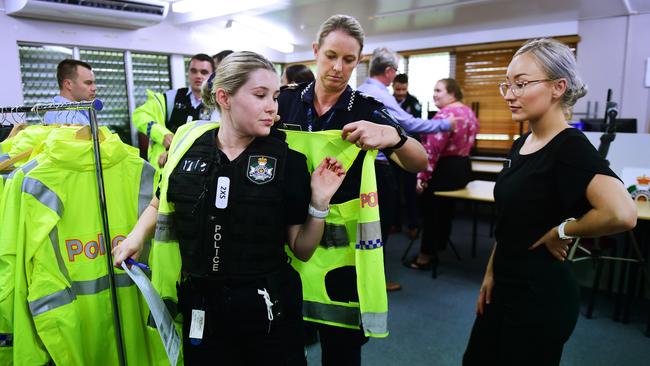Queensland Police row over gender targets
Qld human rights watchdog at loggerheads with Crime and Corruption Commission after report finds ‘more meritorious’ men are losing out.

Queensland’s human rights watchdog has taken aim at a Crime and Corruption Commission report that found men were discriminated against in a bid for women to make up half of all new police recruits.
Queensland Human Rights Commissioner Scott McDougall says he has concerns about the CCC report that estimated 200 “more meritorious” men missed out on being recruited into the state’s police service over several years in a “discriminatory” drive to hire more women.
Mr McDougall said the recruitment of women into policing was “critically important” amid the shocking and ongoing problem of domestic violence, and that adjusting recruitment practices to achieve greater diversity was not unlawful discrimination.
He took issue with comments made by CCC chairman Alan MacSporran QC while publicly discussing the report this week.
Mr MacSporran said on Wednesday that Queensland police had failed to apply for an exemption to engage in positive discrimination “so it was unlawful conduct”.
“The CCC report shouldn’t undermine the legitimacy and lawfulness of equal opportunity measures, which are protected by s105 of Queensland’s Anti-Discrimination Act without needing to apply for an exemption,” Mr McDougall said.
“While applying for an exemption may have been desirable, the absence of an application doesn’t necessarily mean that QPS engaged in unlawful discrimination. The suggestion by the chairman of the CCC that the failure to apply for an exemption amounted to unlawful discrimination would therefore appear to be incorrect.”
The CCC’s Investigation Arista report revealed that to meet a 50-50 gender target for police recruits, the Queensland Police Service had selected women who had previously failed psychological and physical assessments and standards.

Mr McDougall said he wanted to clarify how the law operated in relation to equal opportunity and recruitment.
“When recruiting, organisations need to look at the genuine occupational requirements for the roles they’re recruiting for,” he said. “The QPS themselves state that the attributes important to operational police officers are things like good communication skills, problem solving, compassion, and an ability to defuse situations.
“Adjusting recruitment techniques to ensure gender diversity, while still testing for genuine occupational requirements is an indication of equitable hiring practice, not discrimination under the law.”
He added that the police force needed “to reflect the community they’re policing”.
At the time that the 50-50 target was introduced in 2015, about three-quarters of police officers were men.
Mr McDougall said he had spoken to Queensland police commissioner Katarina Carroll about the issue and that the two agencies had committed to work together to increase the diversity of police recruits.
“When we look at issues confronting the QPS at the moment — like domestic violence and safe workplaces for women — increasing the numbers of women in the police force is a critically important strategic and operational requirement,” he said.
A CCC spokesman said the agency accepted discrimination could be lawful under the Human Rights Act in some circumstances. “The CCC’s point in Investigation Arista is that nothing was ever the subject of analysis at the QPS as to whether that was their legal position or otherwise,” the spokesman said.




To join the conversation, please log in. Don't have an account? Register
Join the conversation, you are commenting as Logout